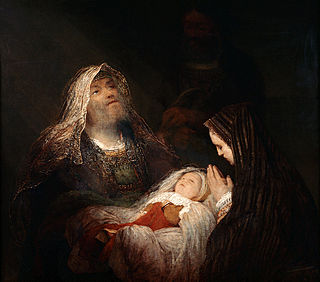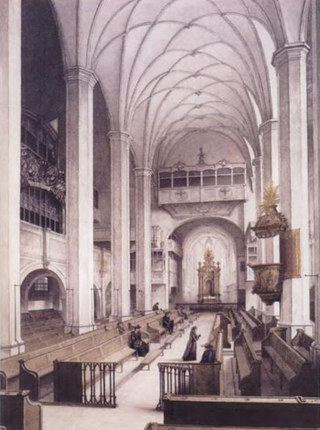Related Research Articles

Wachet auf, ruft uns die Stimme, BWV 140, also known as Sleepers Awake, is a church cantata by Johann Sebastian Bach, regarded as one of his most mature and popular sacred cantatas. He composed the chorale cantata in Leipzig for the 27th Sunday after Trinity and first performed it on 25 November 1731.

Ich habe genug, BWV 82, is a church cantata by Johann Sebastian Bach. He composed the solo cantata for bass in Leipzig in 1727 for the Feast Mariae Reinigung and first performed it on 2 February 1727. In a version for soprano, BWV 82a, possibly first performed in 1731, the part of the obbligato oboe is replaced by a flute. Part of the music appears in the Notebook for Anna Magdalena Bach. The cantata is one of the most recorded and performed of Bach's sacred cantatas. The opening aria and so-called "slumber aria" are regarded as some of the most inspired creations of Bach.

Philipp Nicolai was a German Lutheran pastor, poet, and composer. He is most widely recognized as a hymnodist.

Sechs Chorale von verschiedener Art: auf einer Orgel mit 2 Clavieren und Pedal vorzuspielen, commonly known as the Schübler Chorales, BWV 645–650, is a set of chorale preludes composed by Johann Sebastian Bach. Johann Georg Schübler, after whom the collection came to be named, published it in 1747 or before August 1748, in Zella St. Blasii. At least five preludes of the compilation are transcribed from movements in Bach's church cantatas, mostly chorale cantatas he had composed around two decades earlier.

The Chronicle of Anna Magdalena Bach is a 1968 film by the French filmmaking duo of Jean-Marie Straub and Danièle Huillet. It was their first full-length feature film, and reportedly took a decade to finance. The film stars renowned harpsichordist Gustav Leonhardt as Johann Sebastian Bach and Christiane Lang as Anna Magdalena Bach. The orchestral music was performed by Concentus Musicus and conducted by Nikolaus Harnoncourt. It is the first of several Straub-Huillet films to be based on works of classical music. The film was entered in the 18th Berlin International Film Festival.

"Wachet auf, ruft uns die Stimme" is a Lutheran hymn written in German by Philipp Nicolai, first published in 1599 together with "Wie schön leuchtet der Morgenstern". It appears in German hymnals and in several English hymnals in translations such as "Wake, Awake, for Night Is Flying", "Wake, O wake! with tidings thrilling", and "Up! Awake! From Highest Steeple". Johann Sebastian Bach based a chorale cantata on the hymn, Wachet auf, ruft uns die Stimme, BWV 140, one of its many musical settings.

Alles nur nach Gottes Willen, BWV 72, is a church cantata by Johann Sebastian Bach. He composed it in Leipzig in 1726 for the third Sunday after Epiphany and first performed it on 27 January 1726. Bach used the opening chorus for the Gloria of his Missa in G minor, BWV 235.

Johann Sebastian Bach composed the church cantata Schwingt freudig euch empor, BWV 36, in Leipzig in 1731 for the first Sunday in Advent. He drew on material from previous congratulatory cantatas, beginning with Schwingt freudig euch empor, BWV 36c (1725). The Gospel for the Sunday was the Entry into Jerusalem, thus the mood of the secular work matched "the people's jubilant shouts of Hosanna". In a unique structure in Bach's cantatas, he interpolated four movements derived from the former works with four stanzas from two important Advent hymns, to add liturgical focus, three from Luther's "Nun komm, der Heiden Heiland" and one from Nicolai's "Wie schön leuchtet der Morgenstern". He first performed the cantata in its final form of two parts, eight movements, on 2 December 1731.

Vox Christi, Latin for Voice of Christ, is a setting of Jesus' words in a vocal work such as a Passion, an Oratorium or a Cantata. Conventionally, for instance in Protestant music of the Baroque era, the vox Christi is set for a bass voice.

Wachet! betet! betet! wachet! is the title of two church cantatas by Johann Sebastian Bach. He composed a first version, BWV 70a, in Weimar for the second Sunday in Advent of 1716 and expanded it in 1723 in Leipzig to BWV 70, a cantata in two parts for the 26th Sunday after Trinity.

Preise dein Glücke, gesegnetes Sachsen, BWV 215, is a secular cantata by Johann Sebastian Bach. He composed the cantata gratulatoria or Dramma per musica in Leipzig as a Festmusik für das kurfürstlich sächsische Haus for the anniversary of the election of August III, Elector of Saxony, as King of Poland, and first performed it on 5 October 1734 in the presence of the Elector.
Sleepers Awake may refer to:

Erhard Egidi was a German cantor, organist and composer of sacred music. He was Kantor at the Neustädter Kirche, Hannover, from 1972 to 1991, where he focused on music in church services, but also conducted concerts, with a preference for works of Johann Sebastian Bach and his own teacher Ernst Pepping. He was appointed Kirchenmusikdirektor, responsible for the church music of Hanover.

Paul Seymour Matthen (1914-2003) was an American bass-baritone, musical scholar and music pedagogue. He attended Columbia University, where he studied chemistry in addition to music. While there he was a student of Friedrich Schorr.

Wachet auf, ruft uns die Stimme, Wf XV:2, is a German chorale motet composed around 1780 by Johann Christoph Friedrich Bach, a son of Johann Sebastian Bach. It is based on Philipp Nicolai's hymn "Wachet auf, ruft uns die Stimme". The motet in E-flat major is written for a four-part choir. It is structured in three movements, quoting in the last movement his fathers's chorale setting.

A chorale is the name of several related musical forms originating in the music genre of the Lutheran chorale:

Julia Kleiter is a German operatic soprano and a concert singer. After her debut as Mozart's Pamina at the Opéra Bastille in Paris, she has appeared at major international opera houses, especially the Zurich Opera, and festivals, including the Salzburg Festival. She is also active as a concert singer, and has recorded Bach with Nikolaus Harnoncourt, among others.

Wiesbadener Bachwochen is a biennial festival of music around Johann Sebastian Bach in Wiesbaden, the state capital of Hesse, Germany. It was initiated and has been run by Martin Lutz. The city awards the Bachpreis der Landeshauptstadt Wiesbaden to an organist who wins the festival's international competition.
Bach composed Wie schön leuchtet der Morgenstern, BWV 1, as chorale cantata for the Marian feast of the Annunciation, for a first performance in a church service in Leipzig on 25 March 1725. The cantata, for soprano, tenor and bass soloists, four-part choir and Baroque orchestra, takes around 25 minutes to perform.

Talia Or is an Israeli-born operatic and concert soprano based in Germany. Her repertoire ranges from concert and lied to contemporary music. She is a lecturer on singing at Musikhochschule München.
References
- 1 2 "Stephen Varcoe (Bass-Baritone)". bach-cantatas.com. 2006. Retrieved 24 September 2010.
- ↑ "Hans-Martin Linde Bach Cantatas & Other Vocal Works". bach-cantatas.com. 2010. Retrieved 24 September 2010.
- ↑ "Cantata BWV 140 Wachet auf, ruft uns die Stimme". bach-cantatas.com. 2010. Retrieved 24 September 2010.
- ↑ "Richard Hickox & Collegium Musicum 90 Bach Cantatas & Other Vocal Work". bach-cantatas.com. 2008. Retrieved 24 September 2010.
- ↑ "Songs Vol 1 / Stephen Varcoe, Clifford Benson". arkivmusic.com. 2008. Retrieved 24 September 2010.
- ↑ Varcoe, Stephen (2000). Sing English Song: a practical approach to the language and the repertoire. London: Thames Publishing. ISBN 0-905210-73-5.
- ↑ Iain Sneddon (November 2010). "Let me Introduce Betty Roe". Musical Opinion .